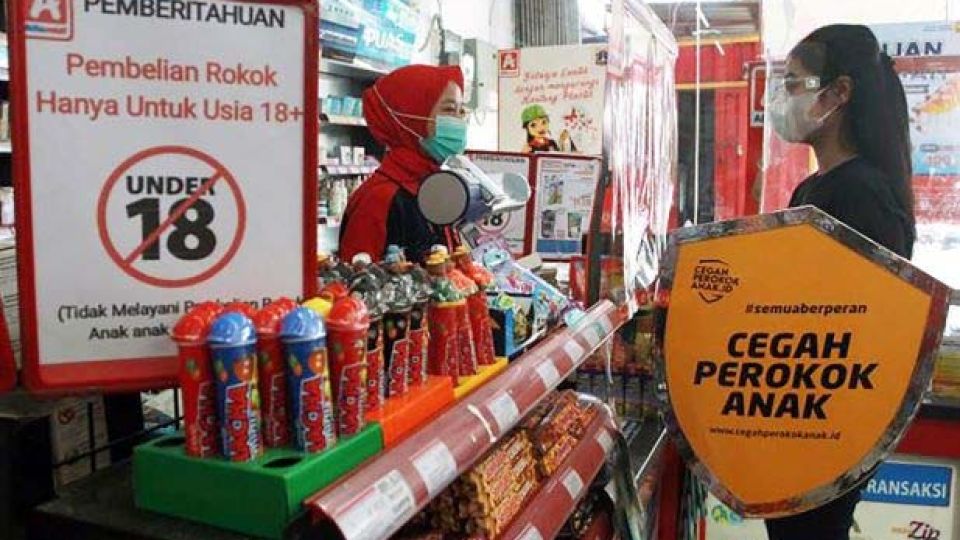August 6, 2024
JAKARTA – The government has just ramped up its measures to curb tobacco use with the issuance of a new regulation that places stricter controls on tobacco sales and distribution.
According to a World Health Organization (WHO) report published earlier this year, the country ranks among the world’s largest cigarette markets and has a high prevalence of young smokers, with a staggering 35.4 percent of adult tobacco users, or more than 70 million Indonesians.
While the prevalence of tobacco use among individuals aged 15 years and above has been declining across the globe from 26.4 percent in 2010 to a projected 18.1 percent in 2030, Indonesia is one of the very few countries where it is projected to increase from 33.2 percent in 2010 to 38.7 percent in 2030.
The new tobacco rule, which was issued late last month among the series of implementing regulations of the 2023 Health Law, aims to prohibit sales of cigarettes and electronic cigarettes (e-cigarettes, also known as vaping devices) to people under 21 and pregnant women.
The new regulation also bans cigarette and e-cigarette sales within 200 meters from an educational institution as well as on digital platforms that do not have an age verification system. Retailers are also prohibited from selling individual cigarettes and all machine-rolled cigarettes (SPM), commonly known as rokok putih (white cigarettes), must be sold in packs of 20 cigarettes.
Read also: Rights groups hail safe abortion rule, urge more details
Observers have previously noted that selling individual cigarettes tend to attract younger consumers, largely because they are sold without packages carrying warning labels and cost less up front.
The new regulation also mandates manufacturers to enlarge the size of graphic warning labels on tobacco packaging from 40 to 50 percent. They must also contain phrases like “No safe limit” and “contains more than 7,000 chemicals, including more than 83 substances that can cause cancer”.
Globally, tobacco kills more than 8 million people every year, including an estimated 1.3 million nonsmokers who are exposed to secondhand smoke.
The government also has tightened control on the promotion and packaging of e-cigarettes, which have remained unregulated since the products were legalized in 2018. These include a maximum cap on nicotine content in e-liquids, a limit of 2 milliliters on the capacity of vape tanks and mandatory health warnings on all packaging.
The WHO report noted that e-cigarette use among Indonesians aged 15 and above had increased 10 times between 2011 and 2021 to 3 percent of the population, or roughly 8.25 million people. As of 2023, around 12.6 percent of Indonesian students aged 13-17 years reportedly used e-cigarettes, a rate significantly higher than the adult population, according to the report.
Under the new regulation, all cigarette and e-cigarette advertisements are banned across social media platforms, as well as within a 500-meter radius from educational institutions and children’s playgrounds.
Smoke-free zones must be established at public places, including parks, places of worship, public transit facilities and office buildings. For the latter, employers must designate an outdoor smoking area that is separate from the main building.
Finally, relevant authorities must provide behavioral counseling and pharmacological intervention for people who want to quit smoking, a deeply ingrained lifestyle habit in Indonesia’s sociocultural environment.
Anti-tobacco proponents have applauded the government’s move to tighten regulatory control on tobacco consumption, although they said the latest effort was still far from ideal.
“In spite of that, we appreciate the policy of President Joko ‘Jokowi’ Widodo’s administration to tighten tobacco control in the country,” Hasbullah Thabrany, who heads the National Committee of Tobacco Control, said on Wednesday.
“We recognize the immense pressure that the government felt from the tobacco industry [over issuing such a strict policy], and although the policy is not perfect, we support its implementation and are ready to help educate the public,” he added.
According to market research company Euromonitor International, Indonesia’s tobacco market was wroth over US$34 billion in 2022, making it the world’s second-largest cigarette market after China.
Read also: More Indonesians smoking, bucking global trend
Tobacco use ranks second in household expenditure only after rice, the main staple food in the country.
Sumarjati Arjoso, who chairs the Tobacco Control Support Center of the Indonesia Public Health Experts Association (TCSC IAKMI), said the new tobacco control policy still contained regulatory loopholes.
“For example, the requirement of 20 cigarettes per pack applies only to rokok putih, but most Indonesian smokers smoke kretek [clove cigarettes]. The government also bans only cigarette advertisements on social media, despite the [massive] tobacco advertisements in other [types of] media,” he said on Wednesday.
Indonesia is the only Southeast Asian country that still permits cigarette advertisements on television and in print media.
According to the WHO, 144 countries had completely banned advertising, sponsorship and promotion of tobacco products in the mass media and at points of sale by 2021.
To make matters worse, Indonesia remains the only country in Asia, or one among seven nations around the globe, that has neither signed nor ratified the WHO Framework Convention on Tobacco Control (WHO FCTC).
This landmark treaty provides a legal framework for international cooperation on tobacco control and came into force in 2005 to combat the global tobacco epidemic.


